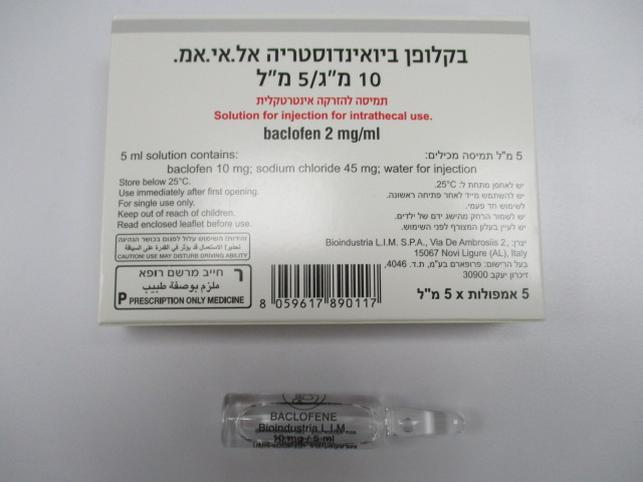Quest for the right Drug

בקלופן ביואינדוסטריה אל.אי.אמ. 10 מ"ג/5 מ"ל BACLOFENE BIOINDUSTRIA L.I.M 10 MG/5 ML (BACLOFEN)
תרופה במרשם
תרופה בסל
נרקוטיקה
ציטוטוקסיקה
צורת מתן:
תוך-שדרתי : INTRATHECAL
צורת מינון:
תמיסה להזרקה : SOLUTION FOR INJECTION
עלון לרופא
מינוניםPosology התוויות
Indications תופעות לוואי
Adverse reactions התוויות נגד
Contraindications אינטראקציות
Interactions מינון יתר
Overdose הריון/הנקה
Pregnancy & Lactation אוכלוסיות מיוחדות
Special populations תכונות פרמקולוגיות
Pharmacological properties מידע רוקחי
Pharmaceutical particulars אזהרת שימוש
Special Warning עלון לרופא
Physicians Leaflet
Adverse reactions : תופעות לוואי
4.8 Undesirable effects Some of the adverse reactions listed below have been reported in patients with spasticity of spinal origin but could also occur in patients with spasticity of cerebral origin. Adverse reactions that are more frequent in either population are indicated below. Adverse drug reactions (Table 1) are listed according to system organ classes in MedDRA. Within each system organ class, the adverse drug reactions are ranked under headings of frequency, the most frequent reactions first. Within each frequency grouping, adverse drug reactions are presented in order of decreasing seriousness. In addition, the corresponding frequency category using the following convention (CIOMS III) is also provided for each adverse drug reaction: very common (≥1/10); common (≥1/100 to <1/10); uncommon (≥1/1,000 to <1/100); rare (≥1/10,000 to<1/1,000); very rare (<1/10,000), and Not known (cannot be estimated from available data). Table 1 Adverse drug reactions Metabolism and nutritional disorders Uncommon: Dehydration Psychiatric disorders Common: Depression, anxiety, agitation. Uncommon: Suicidal ideation (see section 4.4 – Precautions in special patient populations), suicide attempt, hallucinations, paranoia, euphoric mood. Not known: Dysphoria Nervous system disorders Very common: Somnolence Common: Convulsion, confusional state, sedation, dizziness, headache, paraesthesia, dysarthria, lethargy, insomnia, disorientation, Uncommon: Ataxia, memory impairment, nystagmus (Convulsion and headache occur more often in patients with spasticity of cerebral origin than in patients with spasticity of spinal origin). Eye disorders Common: Accommodation disorder, vision blurred, diplopia. Cardiovascular disorders Uncommon: Bradycardia, Vascular disorders Common: Hypotension Uncommon: Hypertension, deep vein thrombosis, flushing, pallor. Respiratory, thoracic and mediastinal disorders Common: Respiratory depression, pneumonia, dyspnoea. Not known: Bradypnoea Gastrointestinal disorders Common: Nausea/vomiting, constipation, dry mouth, diarrhoea, decreased appetite, increased salivation. Uncommon: v Ileus, dysphagia, hypogeusia. (Nausea and vomiting occur more often in patients with spasticity of cerebral origin than in patients with spasticity of spinal origin). Skin and subcutaneous tissue disorders Common: Urticaria/pruritus, facial and/or peripheral oedema. Uncommon: Alopecia, hyperhydrosis. Musculoskeletal and connective tissue disorders Very common: Hypotonia Common: Hypertonia Not known: Scoliosis (see section 4.4) Renal and urinary disorders Common: Urinary incontinence, urinary retention (Urinary retention occurs more often in patients with spasticity of cerebral origin than in patients with spasticity of spinal origin). Reproductive system and breast disorders Common: Sexual dysfunction (Intrathecal baclofen may compromise erection and ejaculation. This effect is usually reversible on withdrawal of Baclofene Bioindustria L.I.M. 10mg/5ml). Not known: Erectile dysfunction General disorders and administration site conditions Common: Asthenia, pyrexia, pain, chills Uncommon: Hypothermia. Rare: Life threatening withdrawal symptoms due to drug delivery failure (see section 4.4 – Special warnings and precautions for use “Treatment Withdrawal”). Adverse events associated with the delivery system Adverse events associated with the delivery system (inflammatory mass at the tip of the catheter, catheter dislocation with possible complications, pocket infection, meningitis, overdose due to wrong manipulation of the device) have been reported. Device malfunction resulting in altered drug delivery leading to withdrawal symptoms including death has been reported. Reporting of suspected adverse reactions Reporting suspected adverse reactions after authorisation of the medicinal product is important. It allows continued monitoring of the benefit/risk balance of the medicinal product. Any suspected adverse events should be reported to the Ministry of Health according to the National Regulation by using an online form: https://sideeffects.health.gov.il

שימוש לפי פנקס קופ''ח כללית 1994
Spasticity associated with multiple sclerosis, spinal cord injuries and spinal cord diseases
תאריך הכללה מקורי בסל
01/01/1995
הגבלות
תרופה שאושרה לשימוש כללי בקופ'ח
מידע נוסף
